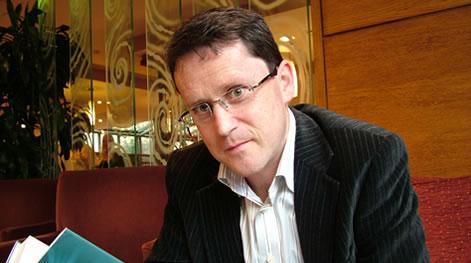George Lee: From backbench politician to backroom reporter

As George Lee’s detachment from party politics is questioned, Fine Gael’s former poster boy will have moved from the backbench to RTE’s backroom when he returns to the national broadcaster next month. By Joe Galvin.
Next month, George Lee will return to RTÉ after his brief and unsuccessful dalliance with politics. Already, before he has even begun, he has been criticised for partisanship.
Last week, Lee said that he was “not sure about the Taoiseach” and that “on the basis of what we’ve heard there certainly appears to be a lot of unrest”. These comments can hardly be described as incendiary, yet the backlash was swift.
The Sunday Tribune reported that a “senior Fianna Fáil source” had said of Lee's comments: “Prior to leaving RTÉ, he was playing RTÉ management like fools in terms of the innuendo and tone of his packages. He clearly intends to continue playing that game.”
Accusations of bias such as the above will continue to made against Lee as he tries to return to journalism. Lee’s position as a domestic journalist has been compromised; his objectivity, a core principle of journalism, is now under question. However, it is certain that he is returning to RTE and he will retain his previous salary, estimated to be circa €150,000 a year.
An RTÉ spokesperson confirmed to Politico that Lee has declared an interest in returning and will do so when his leave of absence expires at the beginning of May. However, the spokesperson could not divulge what role Lee would undertake, saying it was an “internal staff matter”. The likelihood is that he will remain in the doldrums of the state broadcaster considering that his objectivity will now be under constant scrutiny.
Indeed, it is unlikely that Lee's colleagues will get the ticker tape and balloons out to celebrate his return. Lee's announcement that he would stand for a seat in Dublin South last year shocked his colleagues and in particular RTÉ director of news Ed Mulhall. The feeling on the ground within RTÉ may not be particularly sympathetic towards Lee, and it seems unlikely that management will exert too much effort in re-accommodating him in a role that is suited to his abilities.
The result is approximately €150,000 of public money being spent for little return; €150,000 the struggling state broadcaster could put to better use elsewhere. A possible alternative is that Lee becomes a foreign correspondent; at the moment, vacancies are available in both Brussels and Washington, following Sean Whelan's move to the economics desk and Charlie Bird's decision to return home from the US. However, sources in RTÉ suggest Lee would not be amenable to such a move and even in Brussels his judgment would be constantly questioned by the government parties, particularly Fianna Fáil.
Lee is no doubt now fully aware of the mistake he made in moving to politics. However, the question remains whether or not it is fair that the public should pay the costs of his mistake by funding his six figure salary through the licence fee. It seems likely that Lee's decision to leave politics so swiftly was influenced by his knowledge that his RTÉ job, and the salary it commands, would be waiting for him should he change his mind.
Lee said in his resignation statement: "I do not believe I would be serving the electorate honestly if I were to continue allowing my efforts and mandate to be used to promote and market economic policies into which I have had no input." If Lee was truly keen on serving the public honestly, however, it is unlikely he would return to RTÉ and take its money to do a job he himself knows is now almost impossible for him to do.
Nevertheless, perhaps Lee will do the impossible and return to domestic journalism from politics, a return trip no-one before him has successfully navigated. If he does, there is a silver lining. His free parking space in Dáil Éireann will undoubtedly aid him in his coverage of political events in the Oireachtas.
